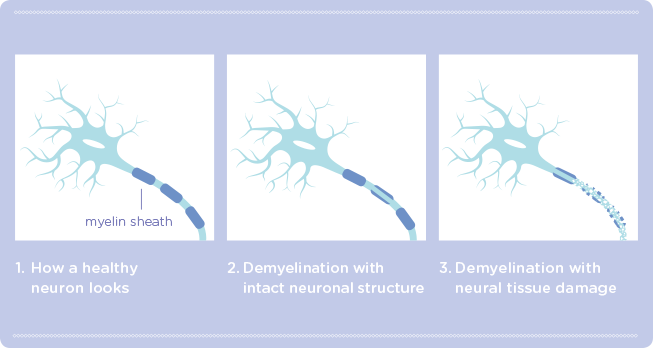About Multiple Sclerosis
Relapsing MS and its treatment
The immune system in people with multiple sclerosis (MS) attacks and damages the protective covering of the nerves in the brain and spinal cord called myelin. This makes it difficult for the nerves to function and to communicate with the rest of the body. Over time, these nerve fibers may be damaged as well and die, resulting in numbness, tiredness, problems with walking and thinking, as well as other symptoms.

What is relapsing MS?
Relapsing MS (RMS) is the most common form of multiple sclerosis. A relapse describes the appearance of new symptoms, or the worsening of old symptoms due to inflammation in the brain or spinal cord. The symptoms of relapses vary from person to person and from one exacerbation to another. Most relapses last from a few days to several weeks. The term ‘relapsing MS’ applies to people with either relapsing-remitting multiple sclerosis (RRMS) or secondary progressive multiple sclerosis (SPMS) who experience relapses.
In the relapsing/remitting phase of MS, patients experience episodes of neurological dysfunction (relapses) separated by periods of relative stability. Complete recovery from relapses may occur in the early stage of MS, but recovery tends to be incomplete over time, leading to the accumulation of physical disability and cognitive decline.
Most people who are diagnosed with RRMS will eventually transition to a secondary progressive course in which there is a progressive accumulation of disability over time, with or without episodes of relapses.
Treating relapsing MS
Today’s MS treatments aim to reduce the frequency and severity of relapses and the accumulation of physical disability resulting from relapses by modulating the immune system. However, no therapy is currently able to promote the repair of myelin or nerve fibers.
To reduce the number of relapses and their seriousness, clinicians often prescribe DMTs (Disease Modifying Therapies).
Disease modifying therapies (DMTs)
Disease modifying therapies (DMTs) for MS include treatments such as:
- alemtuzumab (Lemtrada®)
- beta interferons (Avonex®, Betaferon®/Betaseron®, Extavia®, Plegridy® and Rebif®)
- dimethyl fumarate (Tecfidera®)
- fingolimod (Gilenya®)
- glatiramer acetate (Copaxone®)
- natalizumab (Tysabri®)
- ocrelizumab (Ocrevus®)
- teriflunomide (Aubagio®)
These therapies can reduce the number of relapses a patient may experience and can slow down the disease’s progression. However, DMTs can't undo any permanent disability.

